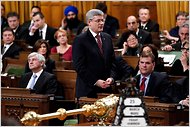
CANADIAN GOVERNMENT, BESET BY SCANDAL FAILS
IAN AUSTEN
The vote sets up new elections, with the date to be announced on Saturday after Prime Minister Stephen Harper meets with Governor General David Johnston, who as Queen Elizabeth II’s representative acts as the head of state. Under Canadian laws, the earliest possible election date is May 2.
Though members of the three opposition parties celebrated the government’s defeat in the House of Commons by tossing papers into the air, their parties appear to be starting the campaign from a weak position. For some time, polls have indicated that the Conservatives remain the strongest national political party.
But for a month Mr. Harper’s government has been beset by controversy and minor scandals.
A study by the parliamentary budget officer, Ken Page, concluded that the government had understated by $12 billion the cost of a purchase of 65 F-35 fighter jets from Lockheed Martin. The Conservative Party and several of its top officials have been charged with election law violations. Most recently, Mr. Harper asked the police to investigate reports that one of his former aides, a 66-year-old disbarred lawyer who was once jailed for fraud, had improperly lobbied the government about a contract that would benefit the man’s 22-year-old fiancée.
Although Canada fared better than most countries in the recession, Mr. Harper said the opposition, by forcing an election, had created a distraction that would jeopardize the economy. He is expected to use the relatively healthy economic situation as the centerpiece of his campaign.
In brief remarks to reporters, Mr. Harper said the vote on Friday “will, I suspect, disappoint Canadians.”
Michael Ignatieff, the leader of the Liberal Party, said the claim that the election would cause economic harm was “ridiculous.”
In what will probably be a theme of the Liberal campaign, Mr. Ignatieff, introducing the motion that led to the government’s fall, called Mr. Harper’s governing approach anti-democratic.
“A government that breaks the rules and conceals facts from the Canadian people does not deserve to remain in office,” said Mr. Ignatieff, who will be leading his party in an election for the first time.
Mr. Harper’s government appeared doomed on Tuesday when all of the opposition parties said they would not support its budget. By tradition, Canadian governments fall when defeated on a budget bill.
Rather than continue with the budget debate, however, the Liberals sought the vote to bring down the Conservatives. The motion of contempt, passed in the House of Commons on a vote of 156 to 145, charged that the government had failed to provide accurate financial information for several programs, including the F-35 jets and crime legislation that is likely to increase the prison population.
The government has rejected suggestions that it is understating the costs of the jets.
All lawmakers of the opposition parties, who outnumber Conservative members of Parliament, voted for the motion.
C. E. S. Franks, an authority on Canadian parliamentary practice who is professor emeritus of political science at Queen’s University in Ontario, said it was the first time a Canadian government had been found in contempt of Parliament. Eight individuals have been found in contempt, he said.
Professor Franks said the Conservatives deserved credit for their economic record and for governing “reasonably competently,” but he was very critical of the government’s approach to politics.
“It’s treated Parliament like the enemy,” he said.
The coming election will be the fourth in seven years for Canada. Under Mr. Harper, the Conservatives have twice formed the government following elections in which they failed to capture a majority of seats. Because the Conservatives need to gain only about a dozen seats for a majority, they are expected to concentrate their campaign efforts on constituencies that have opposition lawmakers but that polling shows are most likely to change allegiances.
March 25, 2011

